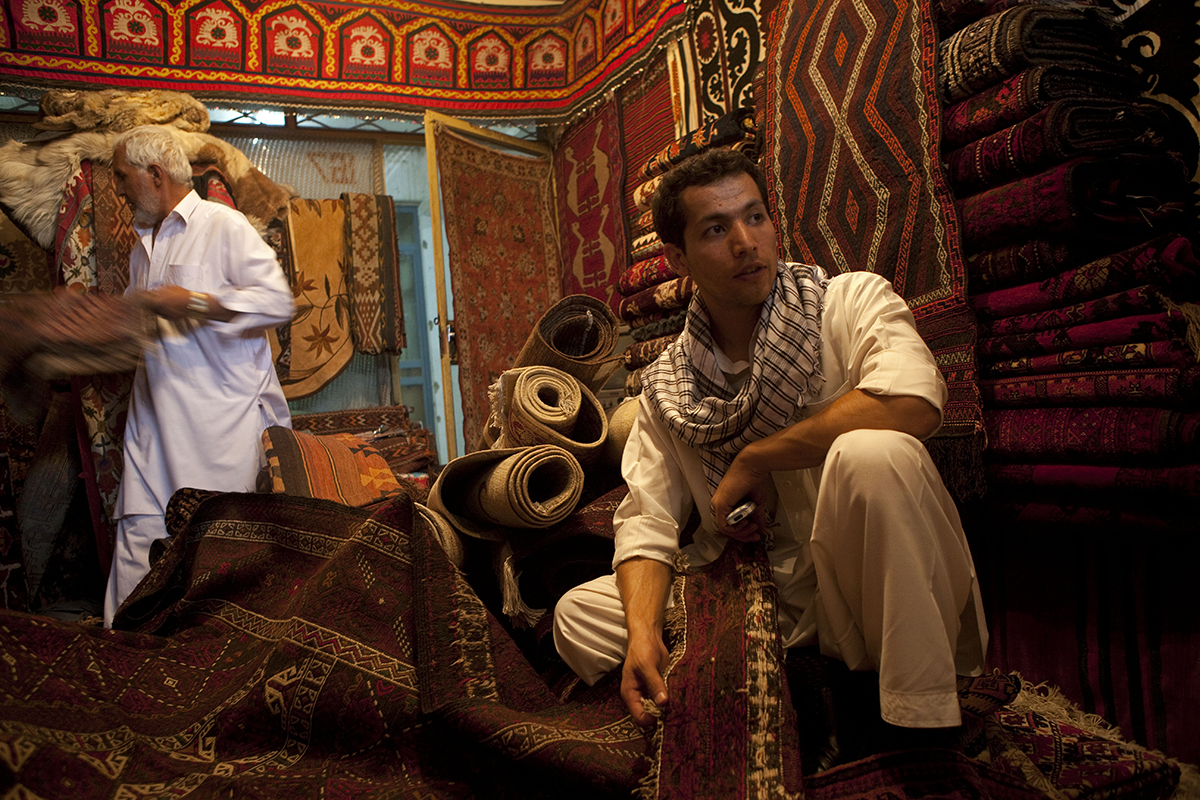Q&A: Qais Akbar Omar, Author of A Fort of Nine Towers

Photo Provided
Qais Akbar Omar’s childhood was bookended by occupations: the withdrawal of the Soviets in 1989 and the American invasion of Afghanistan in 2001. In between, his family, owners of a Kabul carpet business, struggled to survive violence, hunger, and displacement following the mujahideen takeover and bloody civil war that ravaged the country.
But despite this violence, Omar’s acclaimed 2013 memoir, A Fort of Nine Towers: An Afghan Family Story, also provides a rare glimpse into the candlelit storytelling, rooftop kite-flying, and tree-lined Kabul streets seldom portrayed in American media coverage of Afghanistan. The massive publicity following the book’s release endangered Omar’s return to his homeland. This fall, the recent graduate of BU’s creative writing program begins a year as one of Harvard University’s Scholars at Risk, which provides funding and support for intellectuals facing persecution in their home countries. On the brightly colored chairs of Harvard Yard, we caught up with 31-year-old Omar, who spoke softly but firmly as he shared his thoughts on his book, literature, politics, and life in exile.
How did you originally decide to study in the U.S.?
In 2008 I came to the United States as a visiting scholar at Colorado University to find ways to wash carpets with environmentally safe chemicals, because we use soda and bleach and that’s not good for the environment. So I had a glimpse of America—I was here for four months. As soon as I walked into Colorado University, and walked into a class, and saw how people teach and what the system is like, I was very excited. Even though I was just a visiting scholar, I was excited to one day sit in one of these chairs and enjoy the education that I never had. When I was in the third grade, civil war happened and I was never in school. Then the Taliban came and I went to school once a week, just to sign my attendance sheet. When the Americans came, I had two years of [university]. So overall I had five years of education, and I said, I’ve got to come and fill the gap in my education.
So you weren’t necessarily worried about your safety back then?
I didn’t know about that until later. When I came to America, the book came out and I got one review after another, and not just in this country—in Australia, England, more than 25 countries. The reviews were streaming in from all over the world. And in Afghanistan, there are now probably 60 TV channels in Kabul alone. The reviews that I got in all these languages were translated and talked about on TV. They tried to interview me, and when I said no, they went ahead and talked about me anyway. The book suddenly got a lot of attention in Afghanistan, even though it’s not translated in our local language. It got so much publicity, which I never thought would happen. Then I wrote a couple of op-eds for the New York Times. A lot of people came to our [family’s carpet] shop to “take me out to lunch”—they take you for lunch and then your family never sees you again. That was what they were saying. So my father had to close our carpet shop about six months ago.
My mom passed away about four and a half months ago. I could not go to my mom’s funeral ceremony. It was heartbreaking. My father thought that if I came, a lot of people would know that I was there. Afghan funerals are really huge. I have over 200 first cousins. Who knows what would happen? Say a suicide bomber comes for you, and then other people die with you. I couldn’t go. It was just so painful. That’s why this publicity… It’s so good that people read and understand what our family went through, and what so many families in Afghanistan went through, but for me, I had to say goodbye to my country for a while.
What were your initial motivations behind writing the memoir?
People always asked me, “What was life like during the years of the Taliban? And before that, the mujahideen?” And the more I talked about it, the more I felt better. It was like therapy. But I could not find enough people to tell them my story. And then there were times that something would trigger in my mind and would keep me depressed. So my friends who knew me a little better said that the best thing for you would be to write it down. We don’t have therapy in Afghanistan. We don’t have psychiatrists, any of those things. They said, “You should just sit and write it down.” That’s what I did. I started writing in Dari, but I couldn’t. I had such an attachment to the Dari language, and it was just too hard, too painful. I couldn’t even come up with sentences. Everything would come out, and it would be too much—just too dangerous.
So many books were written about Afghanistan, but I was a bit angry with some of [what they wrote]. I appreciated that they gave the time and made the effort to write about my country, but everything was on the surface. They didn’t understand what was going on in people’s heads.
How did you manage to write a full memoir in a language not your own?
In 2002, when the Americans [were in] Afghanistan, I could not speak a word of English. When my friends who could speak English went and had jobs with foreigners as a translator, they could make $300 a day. I had a factory [with] 40-50 women working for me making carpets, and I made $300 a month. So I thought, I’ve got to learn this money-making language. And it took me six months to learn the basics. We have two national languages in Afghanistan, Dari and Pashto, and some other languages as well, and so I speak a bunch of them. I can pick up languages very quickly. I taught myself and then I went and got a job with the American military, and then I got a job with the U.N. At the same time I read a lot of books and newspapers.
But I didn’t write anything until 2006, when the suicide bombers started all over again. And then we had these graphic images on TV. [It brought back] what we went through in Afghanistan from the years of the mujahideen, and the Taliban as well. Because, you know, in 2006 the Taliban came back. So one day I just went to my bedroom and started writing in English. And it just came out like that. That painful process went through a filter, which was language. It didn’t feel as painful. And I managed to write. I wrote the whole book in two and a half months.
Of course everything is with me still—your past never leaves you—and anything horrible or tragic that you live or see or read will trigger a world of what you went through. But then it’s in the book, and it’s like those feelings don’t belong to me anymore. I know that that past belongs to me, but for some reason I just say it’s part of my past.
I shared what I had written with three friends I was very close with. And as soon as they finished reading they said, “Man, you have to publish this story.” I said, “Why should I do that?” They said, “Publish it for the rest of the world so they can read and understand all of this.” And I said, “Well, it’s just too personal, it’s about my family, about myself, how can I do that?”
How did you change your mind?
I didn’t do anything about it until 2011, after reading so many books about Afghanistan. So many books were written about Afghanistan—almost every journalist who worked in Afghanistan worked with a book in hand, and I would read some. But I was a bit angry with some of [what they wrote]. I appreciated that they gave the time and made the effort to write about my country, but everything was on the surface. They didn’t mingle with society. They didn’t understand what was going on in people’s heads or even in people’s houses, because they just saw what they liked. [As for the] historical elements, they got it right, but they got it from the books. They didn’t get it from the personal experience of the people who were on the ground, on the front line, and who saw and experienced all of this. So that was very much missing.


